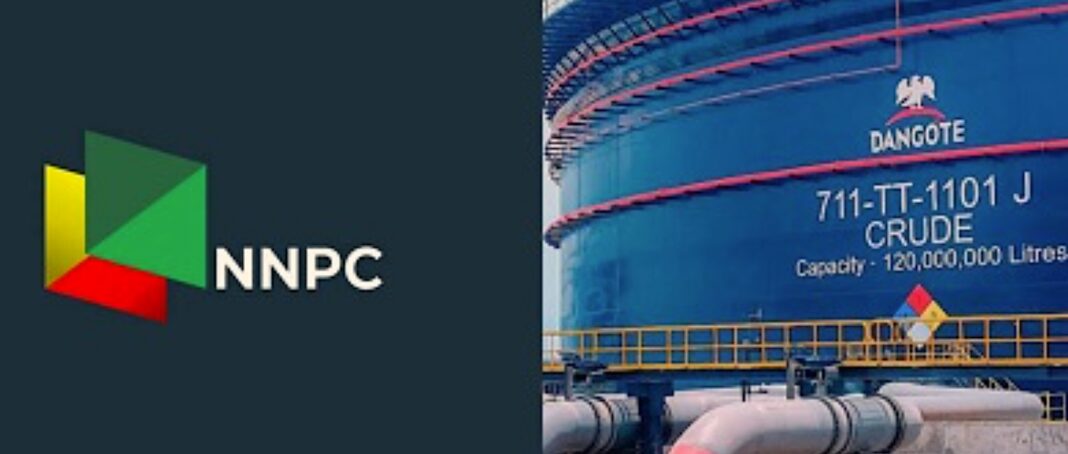The Nigerian National Petroleum Company Limited (NNPCL) recorded a total revenue of N336.37 billion from crude oil sales in the first quarter of 2025, with the Dangote Petroleum Refinery responsible for N107.44 billion, representing more than 32% of the total transactions, The PUNCH has reported.
This information is based on internal NNPCL documents presented at recent Federation Account Allocation Committee (FAAC) meetings and obtained by Sources on Monday.
According to the documents, crude was supplied to Dangote refinery at prices ranging between $74.87 and $80.34 per barrel, using exchange rates from ₦1,501.22/$ to ₦1,562.91/$, as advised by the African Export-Import Bank (Afreximbank). The documents confirmed that, “The Dangote domestic lifting is payable in naira based on Afreximbank-advised exchange rate.”


This arrangement is part of the Federal Government’s naira-for-crude initiative, launched in October 2024, to supply crude oil to domestic refineries in naira rather than U.S. dollars. The initiative aims to reduce pressure on foreign exchange reserves, boost local refining, save on petroleum product imports, and stabilize pump prices.
Initially approved for six months by the Federal Executive Council (FEC) in July 2024, the naira-based crude supply model has since become a key policy directive.
Despite a temporary suspension of naira-based transactions by Dangote Refinery in March 2025—citing foreign exchange mismatches—the FEC later enforced full implementation of the scheme. Following its reinstatement, Dangote Refinery reduced the ex-depot price of petrol to ₦835 per litre, marking its third price cut in under two months and reflecting cost reductions under the naira-for-crude arrangement.
Crude Shipments and Transactions
Seven cargoes totaling 915,821 barrels were delivered to the Dangote refinery during the review period. All were sourced from the Okwuibome field, operated by Sterling Oil Exploration & Energy Production Company (SEEPCO) under a Production Sharing Contract (PSC). The field, located in the Niger Delta, is a key onshore asset operated by SEEPCO, a subsidiary of the Sandesara Group.


The detailed breakdown of the transactions includes:
- Two cargoes delivered on 2 December 2024 aboard Gulf Loyalty:
- 99,737 barrels at $74.87 per barrel, valued at $7.47 million, converted to ₦11.67 billion
- 50,000 barrels at the same price, valued at $3.74 million, converted to ₦5.85 billion
- Due date: 16 January 2025
- Two cargoes lifted on 3 January 2025 aboard Almi Voyager:
- 216,584 barrels at $80.34 per barrel, worth $17.4 million, converted to ₦26.82 billion
- 49,500 barrels at the same price, worth $3.97 million, converted to ₦6.13 billion
- Due date: 7 February 2025
- Two cargoes delivered on 15 February 2025 aboard Sonangol Kalandula:
- 50,000 barrels at $75.895, worth $3.79 million, converted to ₦5.69 billion
- 300,000 barrels (largest single shipment) at same price, worth $22.77 million, converted to ₦34.18 billion
- Due date: 22 March 2025
Labour Concerns at SEEPCO
While SEEPCO’s operations have been vital to crude supply, the company has come under fire for alleged anti-labour practices and violations of local content laws. The Nigerian Content Development and Monitoring Board (NCDMB) and the Petroleum and Natural Gas Senior Staff Association of Nigeria (PENGASSAN) have both raised concerns.

PENGASSAN President, Festus Osifo, led a protest at SEEPCO’s Victoria Island office in Lagos, accusing the company of abusing expatriate quotas and sidelining qualified Nigerian workers. The NCDMB acknowledged these concerns, vowing thorough investigation and sanctions where necessary.
SEEPCO had previously been sanctioned for breaching local content regulations and, although it completed the training of 40 Nigerians in 2022, it reportedly failed to meet its employment obligations. The NCDMB has now scheduled a performance review for March 2025 to assess the company’s compliance efforts.
Despite these controversies, SEEPCO’s crude remains a critical input in Nigeria’s drive for domestic refining and reduced reliance on imported fuel, especially through the landmark partnership with Dangote Petroleum Refinery.




